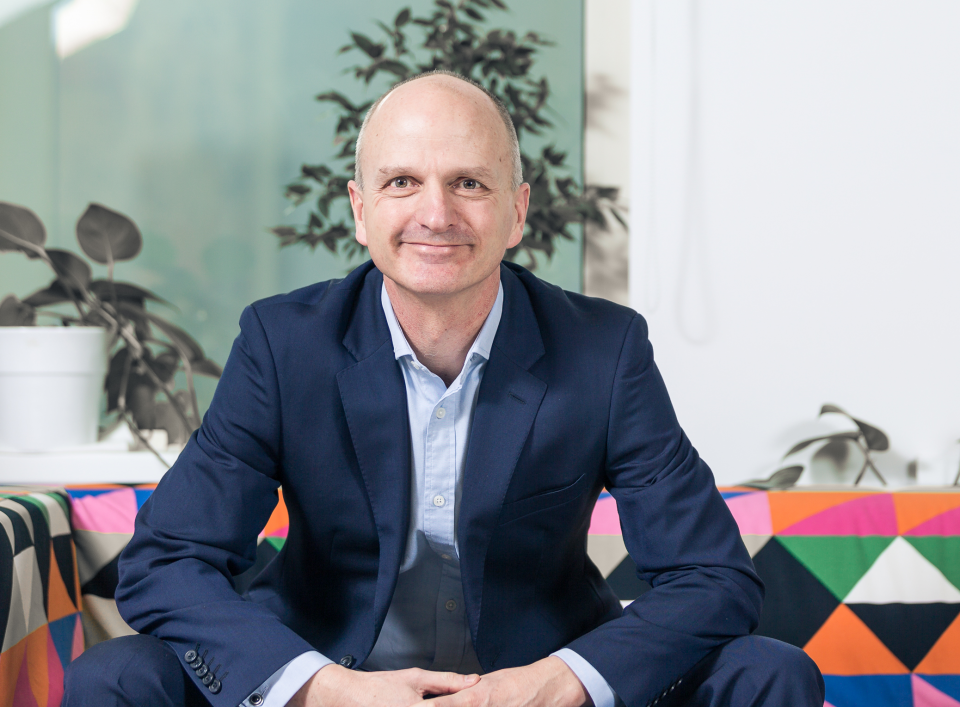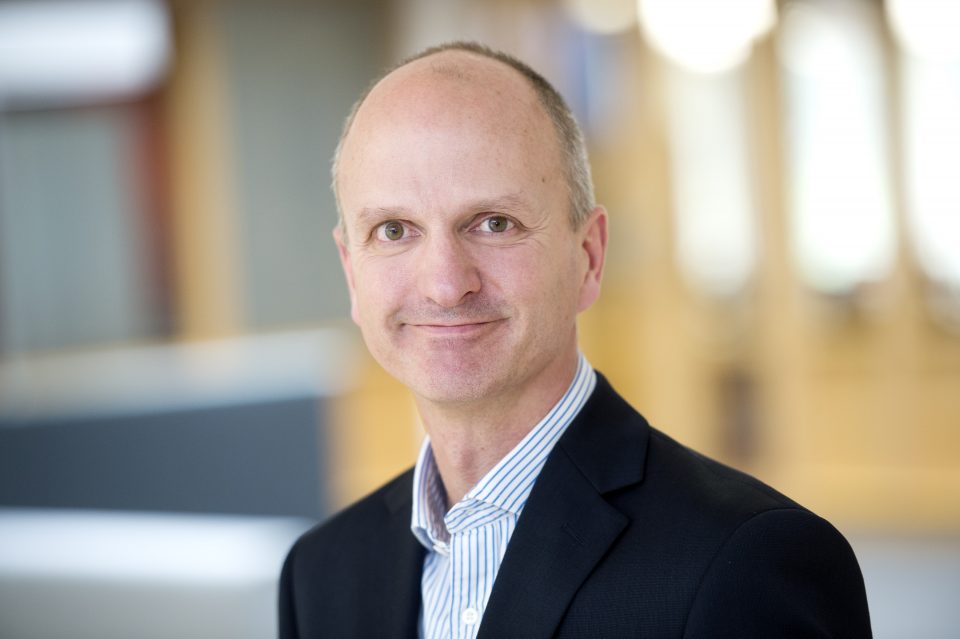Exclusive: Kimberly-Clark’s EMEA president on Kleenex demand exploding overnight
Since Covid took over our lives, the demand for personal care and hygiene products has gone through the roof, changing consumer behaviour and buying patterns forever.
To discuss how this has impacted one of the biggest players in the industry, City A.M. sits down with the EMEA president of Kimberly-Clark, the owner of brands like Andrex, Kleenex and Huggies.
London-based Tris Wilkinson, who is in charge of the American personal care giant’s operations in the UK, Europe, Middle East and Africa, is keen to explain how companies like his can continue to drive success and grow post-pandemic.

You sell products like Andrex, Kleenex, Huggies. Since the outbreak of the Coronavirus, personal care has never been bigger. Have you flourished during three lockdowns?
We’ve been in business for nearly 150 years and I have been with the company over 20 years, yet the past 12 months have been one of the most volatile and unpredictable trading periods we have ever experienced. Consumer behaviour changed rapidly and unpredictably, especially when the first lockdowns kicked in back in March 2020 in Europe and in the UK. As a producer of personal and intimate care products in the midst of a pandemic, we saw demand more than double overnight for some of our products. Subsequent lockdowns didn’t trigger such high spikes, but demand remained volatile throughout the year.
How did you meet that sudden jump in demand?
We have a strong supply chain and a flexible network of manufacturing operations which we can rely on, so we were able to ensure that supply was never an issue. For example, our UK mills make over 1 billion Andrex toilet rolls per year, but the challenge was getting our products onto the shelves and into the hands of consumers. We also increased our market share in almost all our measured categories and for us, this is the greatest reward as it shows that more consumers decided to put their trust in our products during this challenging time.
How have consumer cleaning trends and hygiene behaviours changed since Covid became a household name?
Yes, we have seen consumer behaviour towards hygiene change. Cleaning and disinfecting have become a near-constant part of our everyday lives. Today, washing or sanitizing our hands and cleaning the things we touch is something we all do proactively. We believe some of these behaviours are here to stay. Some of our recent consumer research in the UK revealed that, even for the three-quarters of people who say they will have the vaccine as soon as its available, their increased usage of hygiene products is likely to continue: six in 10 people say they will use the same, or even more, anti-bacterial hand gel and five in 10 people think they will use the same or more masks.
Now vaccines are being rolled out and the economy is re-opening, how do you prepare for further growth in a post-pandemic market?
As we look towards what we hope will be the ending of social restrictions, the broader context is also important for the post-pandemic market. Countries in EMEA and around the world are at very different stages and they will all recover at different speeds. Today, demand remains dynamic but generally has normalised again.
In reality, there is still significant unpredictability and challenges in the short term.
We are seeing an impact on demand in several of our categories this year, from both the recessionary effects of the pandemic and knock-on macro-economic challenges.
In this context, consumers will have a heightened sensitivity to the value that brands offer so we are focused on serving our consumers better than ever through our purpose-led brands and innovation. We are also reflecting to make sure we apply learnings from how we operated throughout the last year, for instance enabling our teams to work with increased flexibility and agility.
Where do you see opportunities for growth in the UK and EMEA region post-pandemic?
Throughout the changes and challenges of the past year we have seen real opportunities for growth across both the UK and EMEA regions. From growing existing networks, to reaching new geographies and innovating new product ranges – there is a wide range of opportunity in the personal care industry right now.
In fact, in the UK, our mill in Barrow will be soon completing a two-year, £85m upgrade programme within its state-of-the-art facilities in Cumbria, which produces over half of the Andrex toilet paper and nearly all Kleenex boxed tissues for the UK.
And further afield?
Outside of Europe, we see significant opportunity in the Middle East & Africa in the next few years. Our organic growth in the region doubled last year and we aim to double our business there by 2025.
We know that 250 million babies will be born in the Middle East and Africa in the next five years.
In Nigeria for instance, which is Africa’s largest economy and most populated country with one of the highest birth rates in the world, Kimberly-Clark has invested $100m to date, including a brand-new mill in Lagos which will open this year. We want to bring more brands to more MEA markets, particularly to support mothers and women in regions where increasing access to nappies and feminine hygiene products can have a significant positive impact on lives.
Let’s jump back to the UK for a second. We have left Brexit behind us, has this impacted your business, yet?
We have a very strong British manufacturing presence, with all our Huggies baby wipes and nearly all of our Andrex toilet paper and Kleenex tissue boxes being manufactured right here in the UK. This has helped us to assure our customers that regardless of any challenges posed by Brexit, we would be able to provide a steady and continuous supply.
Ahead of Brexit, we prepared very detailed plans that were established across our supply chains, preparing for all eventualities.
The challenges faced in 2020 resulted in rapid adaptation and improvements across our supply chain. We now have an even more digitalised, adaptable and resilient supply chain which enables us to respond to fluctuations in consumer demand in an agile and flexible way that was able to manage Brexit seamlessly.

Finally, sustainability was a major buzzword before the pandemic, has Covid and its devastating impact made this less of an issue?
Sustainability remains at the top of our agenda. Like many companies, we moved fast to bring new products to market to respond to consumers’ needs in the wake of Covid-19. But we remain focused on developing new product solutions to make the lives of our consumers better while reducing our impact on the environment at the same time.
For example, in the last year in the UK, we launched a new range of Huggies Pure Biodegradable wipes that are plastic-free and made with 100 per cent naturally derived fibres. We also removed the plastic openings of our Kleenex boxes and handles on Andrex wrapped packs; we’re now using 30 per cent PCR recycled plastic in our packaging on the majority of our Andrex range and we’ve just introduced a new paper wrap on our Andrex Gentle Clean 4-roll packs. And these are only a few examples.
We know that the next decade is critical in tackling global sustainability challenges, and particularly the issue of climate change.
It’s not only the right thing to do, it’s a business imperative; more than ever, people want to work for and buy from brands that are making a positive contribution to society. And it’s an opportunity too. The last year has really crystalised how important what we do is, and the opportunity we have for positive impact at scale.
You have a long-term strategy in place?
Our new 2030 strategy which we launched last year aligns to the decade of action of the UN Sustainable Development Goals. We are working on reducing our carbon, plastics and water footprint by half, in line with what’s required to meet the Paris Agreement. And this is also about Social Impact – we want to improve the wellbeing of 1 billion people through our brands and through NGO and strategic partnerships. It’s a journey – we have a lot more to do and a lot more to learn!